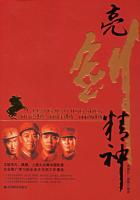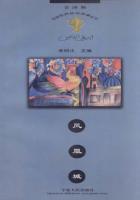ACQUIRING CONFIDENCE BEFORE AN AUDIENCE
There is a strange sensation often experienced in the presence of an audience. It may proceed from the gaze of the many eyes that turn upon the speaker, especially if he permits himself to steadily return that gaze. Most speakers have been conscious of this in a nameless thrill, a real something, pervading the atmosphere, tangible,evanescent, indescribable. All writers have borne testimony to the power of a speaker's eye in impressing an audience. This influence which we are now considering is the reverse of that picture—the power their eyes may exert upon him,especially before he begins to speak: after the inward fires of oratory are fanned into flame the eyes of the audience lose all terror.
—WILLIAM PITTENGER, Extempore Speech
Students of public speaking continually ask,"How can I overcome self-consciousness and the fear that paralyzes me before an audience?"
Did you ever notice in looking from a train window that some horses feed near the track and never even pause to look up at the thundering cars, while just ahead at the next railroad crossing a farmer's wife will be nervously trying to quiet her scared horse as the train goes by?
How would you cure a horse that is afraid of cars—graze him in a back-woods lot where he would never see steam-engines or automobiles, or drive or pasture him where he would frequently see the machines?
Apply horse-sense to ridding yourself of selfconsciousness and fear: face an audience as frequently as you can, and you will soon stop shying. You can never attain freedom from stage-fright by reading a treatise. A book may give you excellent suggestions on how best to conduct yourself in the water, but sooner or later you must get wet, perhaps even strangle and be "half scared to death." There are a great many"wetless" bathing suits worn at the seashore, but no one ever learns to swim in them. To plunge is the only way.Practise, practise, PRACTISE in speaking before an audience will tend to remove all fear of audiences, just as practise in swimming will lead to confidence and facility in the water. You must learn to speak by speaking.
The Apostle Paul tells us that every man must work out his own salvation. All we can do here is to offer you suggestions as to how best to prepare for your plunge. The real plunge no one can take for you. A doctor may prescribe, but you must take the medicine.Do not be disheartened if at first you suffer from stage-fright. Dan Patch was more susceptible to suffering than a superannuated dray horse would be.It never hurts a fool to appear before an audience, for his capacity is not a capacity for feeling. A blow that would kill a civilized man soon heals on a savage.The higher we go in the scale of life, the greater is the capacity for suffering.
For one reason or another, some master-speakers never entirely overcome stage-fright, but it will pay you to spare no pains to conquer it. Daniel Webster failed in his first appearance and had to take his seat without finishing his speech because he was nervous.Gladstone was often troubled with self-consciousness in the beginning of an address. Beecher was always perturbed before talking in public.
Blacksmiths sometimes twist a rope tight around the nose of a horse, and by thus inflicting a little pain they distract his attention from the shoeing process. One way to get air out of a glass is to pour in water.
Be Absorbed by Your Subject
Apply the blacksmith's homely principle when you are speaking. If you feel deeply about your subject you will be able to think of little else. Concentration is a process of distraction from less important matters.It is too late to think about the cut of your coat when once you are upon the platform, so centre your interest on what you are about to say—fill your mind with your speech-material and, like the infilling water in the glass, it will drive out your unsubstantial fears.
Self-consciousness is undue consciousness of self,and, for the purpose of delivery, self is secondary to your subject, not only in the opinion of the audience,but, if you are wise, in your own. To hold any other view is to regard yourself as an exhibit instead of as a messenger with a message worth delivering. Do you remember Elbert Hubbard's tremendous little tract, "A Message to Garcia"? The youth subordinated himself to the message he bore. So must you, by all the determination you can muster. It is sheer egotism to fill your mind with thoughts of self when a greater thing is there—TRUTH. Say this to yourself sternly,and shame your self-consciousness into quiescence.If the theater caught fire you could rush to the stage and shout directions to the audience without any selfconsciousness, for the importance of what you were saying would drive all fear-thoughts out of your mind.Far worse than self-consciousness through fear of doing poorly is self-consciousness through assumption of doing well. The first sign of greatness is when a man does not attempt to look and act great. Before you can call yourself a man at all, Kipling assures us, you must "not look too good nor talk too wise."
Nothing advertises itself so thoroughly as conceit.One may be so full of self as to be empty. Voltaire said, "We must conceal self-love." But that can not be done. You know this to be true, for you have recognized overweening self-love in others. If you have it, others are seeing it in you. There are things in this world bigger than self, and in working for them self will be forgotten, or—what is better—remembered only so as to help us win toward higher things.
Have Something to Say
The trouble with many speakers is that they go before an audience with their minds a blank. It is no wonder that nature, abhorring a vacuum, fills them with the nearest thing handy, which generally happens to be, "I wonder if I am doing this right! How does my hair look? I know I shall fail." Their prophetic souls are sure to be right.
It is not enough to be absorbed by your subject—to acquire self-confidence you must have something in which to be confident. If you go before an audience without any preparation, or previous knowledge of your subject, you ought to be self-conscious—you ought to be ashamed to steal the time of your audience.Prepare yourself. Know what you are going to talk about, and, in general, how you are going to say it.Have the first few sentences worked out completely so that you may not be troubled in the beginning to find words. Know your subject better than your hearers know it, and you have nothing to fear.
After Preparing for Success, Expect It
Let your bearing be modestly confident, but most of all be modestly confident within. Over-confidence is bad, but to tolerate premonitions of failure is worse,for a bold man may win attention by his very bearing,while a rabbit-hearted coward invites disaster.
Humility is not the personal discount that we must offer in the presence of others—against this old interpretation there has been a most healthy modern reaction. True humility any man who thoroughly knows himself must feel; but it is not a humility that assumes a worm-like meekness; it is rather a strong,vibrant prayer for greater power for service—a prayer that Uriah Heep could never have uttered.
Washington Irving once introduced Charles Dickens at a dinner given in the latter's honor. In the middle of his speech Irving hesitated, became embarrassed,and sat down awkwardly. Turning to a friend beside him he remarked, "There, I told you I would fail, and I did."
If you believe you will fail, there is no hope for you. You will.
Rid yourself of this I-am-a-poor-worm-in-the-dust idea. You are a god, with infinite capabilities. "All things are ready if the mind be so." The eagle looks the cloudless sun in the face.
Assume Mastery Over Your Audience
In public speech, as in electricity, there is a positive and a negative force. Either you or your audience are going to possess the positive factor. If you assume it you can almost invariably make it yours. If you assume the negative you are sure to be negative.Assuming a virtue or a vice vitalizes it. Summon all your power of self-direction, and remember that though your audience is infinitely more important than you, the truth is more important than both of you, because it is eternal. If your mind falters in its leadership the sword will drop from your hands. Your assumption of being able to instruct or lead or inspire a multitude or even a small group of people may appall you as being colossal impudence—as indeed it may be; but having once essayed to speak, be courageous.BE courageous—it lies within you to be what you will.MAKE yourself be calm and confident
Reflect that your audience will not hurt you. If Beecher in Liverpool had spoken behind a wire screen he would have invited the audience to throw the overripe missiles with which they were loaded; but he was a man, confronted his hostile hearers fearlessly—and won them.
In facing your audience, pause a moment and look them over—a hundred chances to one they want you to succeed, for what man is so foolish as to spend his time, perhaps his money, in the hope that you will waste his investment by talking dully?
Concluding Hints
Do not make haste to begin—haste shows lack of control.
Do not apologize. It ought not to be necessary; and if it is, it will not help. Go straight ahead.
Take a deep breath, relax, and begin in a quiet conversational tone as though you were speaking to one large friend. You will not find it half so bad as you imagined; really, it is like taking a cold plunge:after you are in, the water is fine. In fact, having spoken a few times you will even anticipate the plunge with exhilaration. To stand before an audience and make them think your thoughts after you is one of the greatest pleasures you can ever know. Instead of fearing it, you ought to be as anxious as the fox hounds straining at their leashes, or the race horses tugging at their reins.
So cast out fear, for fear is cowardly—when it is not mastered. The bravest know fear, but they do not yield to it. Face your audience pluckily—if your knees quake, MAKE them stop. In your audience lies some victory for you and the cause you represent. Go win it.Suppose Charles Martell had been afraid to hammer the Saracen at Tours; suppose Columbus had feared to venture out into the unknown West; suppose our forefathers had been too timid to oppose the tyranny of George the Third; suppose that any man who ever did anything worth while had been a coward! The world owes its progress to the men who have dared,and you must dare to speak the effective word that is in your heart to speak—for often it requires courage to utter a single sentence. But remember that men erect no monuments and weave no laurels for those who fear to do what they can.
Is all this unsympathetic, do you say?
Man, what you need is not sympathy, but a push. No one doubts that temperament and nerves and illness and even praiseworthy modesty may, singly or combined,cause the speaker's cheek to blanch before an audience,but neither can any one doubt that coddling will magnify this weakness. The victory lies in a fearless frame of mind. Prof. Walter Dill Scott says: "Success or failure in business is caused more by mental attitude even than by mental capacity." Banish the fear-attitude;acquire the confident attitude. And remember that the only way to acquire it is—to acquire it.
In this foundation chapter we have tried to strike the tone of much that is to follow. Many of these ideas will be amplified and enforced in a more specific way; but through all these chapters on an art which Mr. Gladstone believed to be more powerful than the public press, the note of justifiable self-confidence must sound again and again.
QUESTIONS AND EXERCISES.
1. What is the cause of self-consciousness?
2. Why are animals free from it?
3. What is your observation regarding selfconsciousness in children?
4. Why are you free from it under the stress of unusual excitement?
5. How does moderate excitement affect you?
6. What are the two fundamental requisites for the acquiring of self-confidence? Which is the more important?
7. What effect does confidence on the part of the speaker have on the audience?
8. Write out a two-minute speech on "Confidence and Cowardice."
9. What effect do habits of thought have on confidence? In this connection read the chapter on"Right Thinking and Personality."
10. Write out very briefly any experience you may have had involving the teachings of this chapter.
11. Give a three-minute talk on "Stage-Fright," including a (kindly) imitation of two or more victims.















